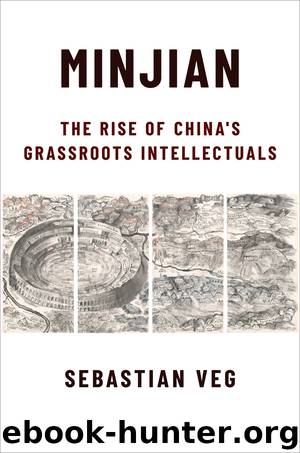Minjian by Sebastian Veg;

Author:Sebastian Veg;
Language: eng
Format: epub
Publisher: Lightning Source Inc. (Tier 3)
FROM THE TURNING POINT OF 2008 TO THE NEW CITIZEN MOVEMENT
The year 2008 represents a kind of turning point in the evolution of China’s minjian society and its relations with the state. The Tibetan uprising and Olympic Flame controversy were followed by the Sichuan earthquake. After a wave of citizen participation in rescue and reporting efforts, the state prioritized cracking down on investigations providing evidence that the high count of casualties was due to man-made causes rather than to the disaster itself, a crackdown that curbed the newfound enthusiasm of civil society to work with the state and dampened international sympathy. The Olympics were a popular success but also coincided with a continued crackdown on social organizations. Jessica Teets argues that this juncture marks a turn away from civil society’s regulatory role with respect to the state (leading to democratization) and toward a “consultative authoritarian” arrangement in which NGOs function both as service providers to the state with “operational autonomy” and as tools of social control, improving governance and ultimately making authoritarianism more efficient.138 This turn, which was further sharpened after 2012, proved detrimental to the further development of legal activism. As Carl Minzner argues, the party–state now “sought to close down rhetoric (constitutionalism), channels (court trials), and social forces (lawyers) that activists had used to mobilize for greater change.”139
In December 2008, Liu Xiaobo and Zhang Zuhua 張祖樺, along with a group of leading liberal intellectuals, launched Charter 08, a call for institutional reform modeled on Václav Havel’s “Charter 77” in Communist Czechoslovakia.140 Intellectuals on the left or at the center criticized Charter 08 for sacralizing private-property rights and paying insufficient attention to social equality: the charter reaffirms equality as a fundamental principle but contains only a general call to do away with the household registration system and to establish social security. Nonetheless, Liu was immediately arrested, and signatories around China were harassed by the police.
Certain reactions to Charter 08 perfectly illustrate the gap between the more traditional view of the intellectual and the minjian position. The economic historian Qin Hui and the literature professor Qian Liqun, two leading voices among critical elite intellectuals, refused to sign because of the charter’s lack of attention to social protection. Yu Jianrong also refused to sign, even although Liu Xiaobo had drafted part of the charter in Yu’s Eastern Study in Songzhuang. As Yu explained in his personal obituary for Liu, “I must say that I agreed in principle with your main points. However, an opinion I repeatedly expressed is that I dislike the way in which great narratives [hongda huayu 宏大話語] completely overlook the individual, especially those vulnerable groups [ruoshi qunti] who today survive in the most precarious situation. To put it another way, I cannot agree with those who hope that the oppressed will be subjected to even more cruel persecution in the expectation of provoking a revolution.”141 In characteristic fashion, Yu preferred concrete, specific problems and the individual approach to the theorizing and lofty constitutional principles expressed in Charter 08, even though he agreed with them in principle.
Download
This site does not store any files on its server. We only index and link to content provided by other sites. Please contact the content providers to delete copyright contents if any and email us, we'll remove relevant links or contents immediately.
| Arms Control | Diplomacy |
| Security | Trades & Tariffs |
| Treaties | African |
| Asian | Australian & Oceanian |
| Canadian | Caribbean & Latin American |
| European | Middle Eastern |
| Russian & Former Soviet Union |
The Secret History by Donna Tartt(19088)
The Social Justice Warrior Handbook by Lisa De Pasquale(12190)
Thirteen Reasons Why by Jay Asher(8910)
This Is How You Lose Her by Junot Diaz(6887)
Weapons of Math Destruction by Cathy O'Neil(6280)
Zero to One by Peter Thiel(5802)
Beartown by Fredrik Backman(5754)
The Myth of the Strong Leader by Archie Brown(5507)
The Fire Next Time by James Baldwin(5446)
How Democracies Die by Steven Levitsky & Daniel Ziblatt(5219)
Promise Me, Dad by Joe Biden(5153)
Stone's Rules by Roger Stone(5088)
A Higher Loyalty: Truth, Lies, and Leadership by James Comey(4964)
100 Deadly Skills by Clint Emerson(4925)
Rise and Kill First by Ronen Bergman(4789)
Secrecy World by Jake Bernstein(4753)
The David Icke Guide to the Global Conspiracy (and how to end it) by David Icke(4720)
The Farm by Tom Rob Smith(4512)
The Doomsday Machine by Daniel Ellsberg(4490)
